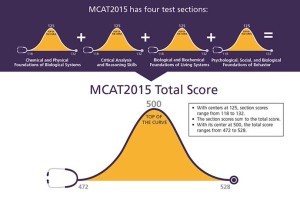For students interested in applying to medical school, a historical moment occurred on April 17, 2015: The first version of the “new” MCAT was administered that day! The “old” version of the MCAT has been around since 1991, so this was a pretty major change.
The new MCAT has 230 questions and takes about 7.5 hours to finish. There are four sections: Biology and Biochemistry, Chemistry and Physics, Psychology/Behavioral Health, and Verbal Reasoning. Scores range from 118-132 per section, or 472-528 overall.

Do I have to take the MCAT?
It depends on what you mean by “have to,” but if you want to attend a medical school in the U.S. then yes, taking the MCAT is almost universal. The only places I know of that don’t look at MCAT scores are three Canadian medical schools (University of Ottawa, McMaster University, Northern Ontario School of Medicine), but they have their own highly selective criteria for getting in.
When should I take the MCAT?
If you are going straight from college to medical school, medical school applications through the AMCAS system are due in December of your senior year. However, most medical schools offer interviews on a rolling basis so it is strongly encouraged that you finish as many applications as possible during the summer before your senior year. Working backwards from that, most students aim to take the MCAT during junior year of college.
If you take the MCAT during spring semester of junior year and don’t score as well as you’d like, you could try again in the summer. It is also becoming more popular to take a “gap year” or two after college before applying to medical school, so if don’t feel ready to take the MCAT junior year, it’s okay to take an extra year to prepare for the test and the rest of your application.
How do I study for the MCAT?
The MCAT requires a lot of studying – probably more than you’ve studied for any other test in your life! The average MCAT test-taker spends over 300 hours preparing for the exam, so start early. You can’t cram this all into one week. From my experience taking the MCAT in 2010, here are some tips:
#1: Go to class! The best thing you can do to prepare for the MCAT is to pay attention during your high school and college courses. Outside study materials will be no help if you don’t have a solid foundation in biology, chemistry, organic chemistry, and physics on which to build. Other helpful classes include psychology, sociology, statistics, and biochemistry. Plan to take these during your first 2 years of college so that you then have time to review using MCAT-specific materials.

#2: Study using questions. Once you’ve taken the prerequisite classes, it’s much more efficient to do practice questions than to read lists and paragraphs of information until your eyes glaze over. Khan Academy has a large, FREE collection of passage-based questions you can check out. Kaplan and Princeton Review also sell question banks and test preparation books; I would recommend going to a bookstore to compare the two styles and see which fits you better.
#3: Use AAMC official MCAT preparation materials. Since the AAMC writes the test, it is good to at least look at the sample questions they offer, and even better, take a full length practice test a few weeks before the real one to get familiar with the format and see where you stand. Their “The Official Guide to the MCAT Exam” ($35) offers practice questions actually written by the test creators, and will offer valuable information on what to expect.
Little known fact: many public libraries actually have a section of “test preparation materials.” If you don’t want to buy the materials, see if your local library carries the MCAT guide and other books of practice questions. Sometimes you can also go into a larger bookstore and do test prep questions there if you don’t want to buy the book.
#4: Get a teacher. If you’ve exhausted all the free and AAMC materials, or if you prefer to be in a classroom with someone to guide your studying, consider a more personal approach. The two big test prep companies, Kaplan and Princeton Review, both offer group classes and private lessons. But if you just search “MCAT tutor” online, tons of other options appear too. This approach is more expensive than studying on your own, but many students find it a worthwhile investment.

